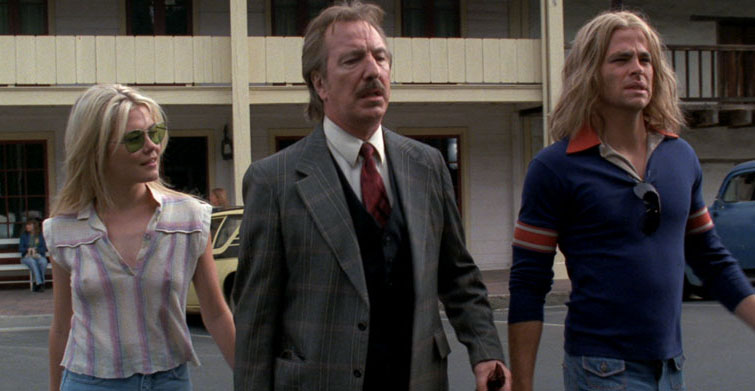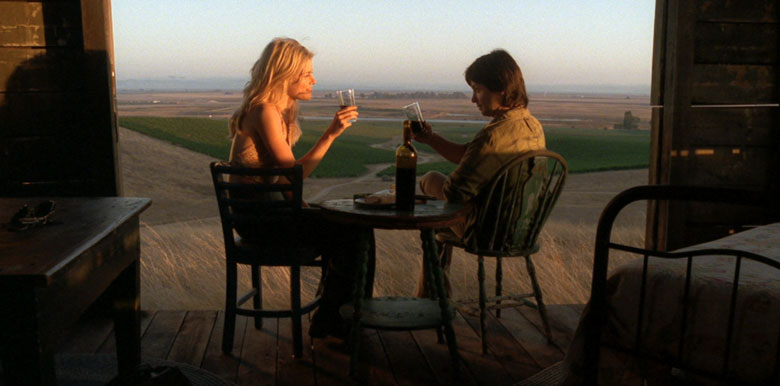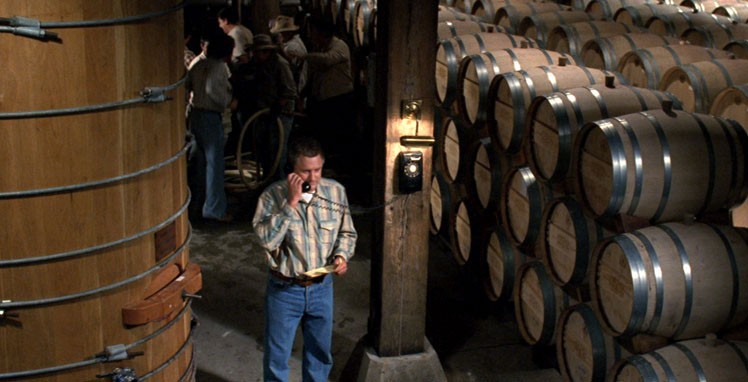
This story comes to life on the silver screen for the first time with the film Bottle Shock, starring Bill Pullman, Alan Richman, and Dennis Farina among other notables. I recently chatted with Bottle Shock Co-Writer and Producer Jody Savin about the film.
Why this film now?
To answer this question in a socio-political sense, I would venture to say that we live in challenging times. The fragile social ego which reigns pervasive could probably use a boost. BOTTLE SHOCK is about having a dream and pursuing a dream at great personal risk. An artistic dream, an individual dream— a dream whose realization rather incidentally comes to have global repercussions. BOTTLE SHOCK is a movie about the courage of the human spirit— and ultimately its triumph. What better medicine for trying times?

After convincing the Barretts and Mr. Brambila to give us permission to tell their personal stories on screen, we then became their disciples. Jim Barrett, Bo Barrett, Heidi Barrett and Gustavo Brambila told us their stories, reviewed and critiqued the script, and sat on set as consultants during the shooting of scenes that begged for a viniological verisimilitude.
As any wine enthusiast can attest, the film Sideways turned the wine industry on its ear, driving up demand for Pinot Noir and turning Merlot into wine's ugly step-child. What scenes in Bottle Shock have similar "wine industry rattling" potential?
I am not sure the answer to this question can point to specific scenes but rather to the joy of the pioneering spirit of the Barretts and their Napa Valley compatriots who dreamed of making fine handcrafted wine in a region previously scorned by the wine establishment. I understand that our focus on Chardonnay might cast a spotlight on a wine that sometimes takes a back seat to the reds. But again, it is the human story (the story of a father and son who risked everything they had in their pursuit of a dream) that interested us and that happened to be the Chardonnay story.
Though Bottle Shock is based on a true story, it is not a documentary. What aspects of the film demanded the most creative license?
There were two characters that were wholly invented-- two characters devised strictly for narrative purposes. We designed Maurice Cantavale (Dennis Farina) as a cipher to the character of Stephen Spurrier (Alan Rickman). We needed an American transplant, a confidant for the Brit in Paris, a character we could at once smile at and imbue with our own point of view. 
Conversely, what parts of the actual tasting would you have liked to include in the film but -for whatever reason- could not?
I don’t think there was any part of this we felt we had to sacrifice. There is certainly a vast tableau of personal stories that converged at the famous 1976 Paris Tasting. Each of the wineries that were selected probably have a good story to tell from the events that led to their participation. But we focused on characters that were compelling to us, and we sculpted their journeys with scenes intentionally stolen or adapted from their specific experiences and the stories they told us.
Winemaking is a delicate mix of art and science. With a world full of wine enthusiasts who pride themselves on knowing the intricacies of wine and how it is made, what did you do to ensure the wine scenes are authentic?
First of all, we read everything we could get our hands on— books and blogs and every relevant magazine article we could dig up from English as well as French publications that dated all the way back to the seventies. And fortunately, a lot of the folks who invested in this movie are seriously into wine, not just the consumption of wine, but also its history, its lore, the science of it. So before we became students of the Barretts, we leaned on these partners to police our authenticity. But research only gets you so far in a science that involves so many of the senses. So taste wine we did.
In the wine tasting scenes, what wines did you use? Are we really watching actors drink Chateau Montelena?
Absolutely not. There is no alcohol on set. The actors were drinking grape juices carefully tinted by our brilliant props master, Chris Ubick, who thankfully lives in Sonoma.
What challenges did you face filming amid flocks of wine tourists on location in Sonoma, where the locals fiercely protect their wine industry and aren't particularly used to the presence of film crews?

How do you think Bottle Shock will be received in France? Is it safe to assume it won't be screened at Cannes?
We did, in fact, screen it at Cannes and no one threw anything at the screen. The film does not endeavor to disparage the French in any way. What happened, happened.
Lastly, you weren't wine aficionados prior to making this film. Did six weeks on location in Sonoma by chance convert you to an oenophile?
We are spoiled now. We like some very expensive wines which, as independent filmmakers, we cannot afford.






